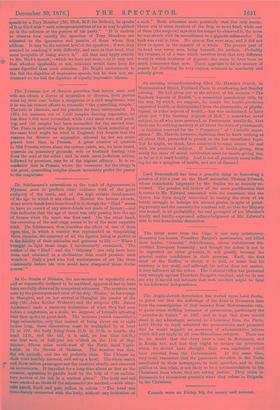The Prussian law of divorce provides that before man and
wife can obtain a decree of separation or divorce, both parties must lay their case before a clergyman or a civil magistrate, who is to use his utmost efforts to reconcile "the quarrelling couple." The rule is absolute, and the practice far from unsuccessful. In 1874, for instance, out of 7,430 couples desiring separation, no less than 2,688 were reconciled, while 1,042 cases were still pend- ing, and 156 couples had been reconciled for the second time. The Times in publishing the figures seems to think something of the same kind might be tried in England, but forgets that the reasons for divorce or separation allowed by law are much graver here than in Prussia. A great number of quarrels in Old Prussia, where alone the system exists, are, we have heard, quarrels on pecuniary grounds, wife or husband fearing ruin from the acts of the other ; and in such cases judicious advice, followed by promises, may be of the highest efficacy. It is re- markable that in Prussia, where the reverence for the clergy is net great, quarrelling couples almost invariably prefer the pastor to the magistrate.


































 Previous page
Previous page